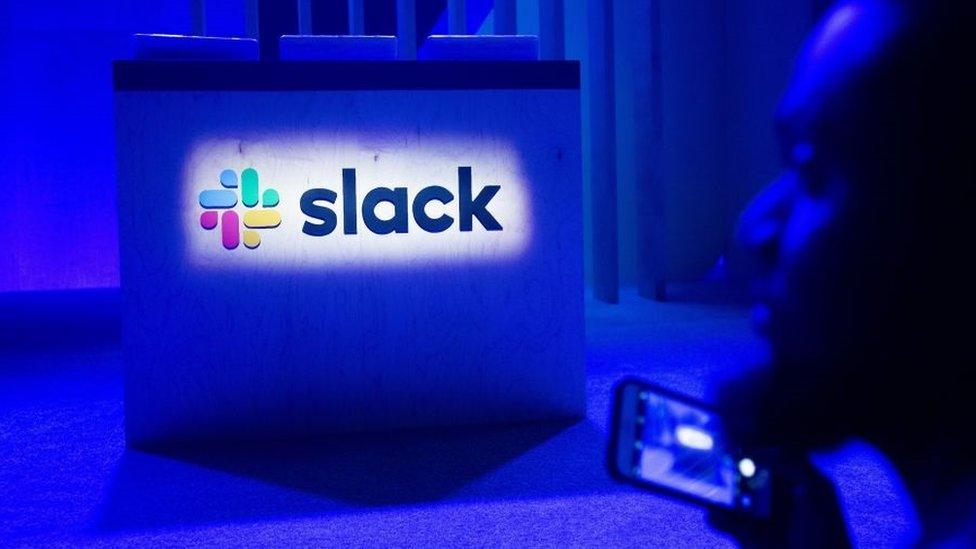Tricks and tools for better working from home
- Published

Louise Halford decided to self-isolate
When one of Louise Halford's staff members returned from a ski trip with flu-like symptoms, she advised him to work from home rather than risk bringing the coronavirus into the office.
Ms Halford also decided to work from home after feeling some possible symptoms as well.
"We work with someone who has a compromised immune system, so I don't want to take any chances," says Ms Halford, co-founder of Manchester-based Evolve Family Law.
Around the world, millions of other people have also been told to stay at home in a bid to slow the spread of Covid-19.
That includes Apple where the chief executive Tim Cook told staff, "feel free to work remotely if your job allows".
Amazon and Google have similar policies in place.
"Employers are definitely taking this seriously," says Hannah Ford, a partner and employment law expert at law firm Stevens & Bolton.
"We are advising lots of clients on crisis management plans."
Fortunately, there are now a huge variety of tools and services available to help employees perform their roles effectively from home.

Demand for videoconferencing services around the world is rising
Keeping in touch
Communicating with colleagues is crucial, which is why remote meeting services are in high demand.
In China, up to 22 times as many people are using Cisco's Webex videoconferencing service since the coronavirus appeared.
Like several of its competitors, it has upgraded its free service in response to the surge in demand.
Anyone signing up to its 90-day free plan can therefore benefit from unlimited usage, while the maximum number of participants is now 100, up from 50.
Rival Zoom also has a free video-conferencing plan. Its free tier allows unlimited one-to-one meetings, as well as group sessions lasting up to 40 minutes and involving 100 participants.


Staying secure
Those new to working from home present a juicy target for hackers, who will no doubt sense an opportunity to steal sensitive information, or commit online fraud.
To keep information secure most companies will use a virtual private network (VPN) to create an encrypted connection from the user's computer to their company IT system.
However, even businesses with a quality VPN may need to buy more user licences or improve the server capacity for everyone to use it at once.
"Companies are increasingly stress-testing their servers to ensure they will cope with everyone working remotely," Ms Ford says.
Another option would be to control your work computer from home using remote desktop software.
You might even want to use both bits of tech, which would provide a secure way to access your work computer.

Check your internet connection before working from home
If you are going to work from home, you might want to check that your internet connection is reliable.
Self-employed accountant Elizabeth Stanley's advice for anyone who may have to self-isolate is therefore to "get your internet connection and security sorted now".
"It's worth checking your home broadband provider allows you to connect to a VPN as this varies between providers, packages, and areas," says Ms Stanley, who is based in Newport, South Wales.
If not, you may need to upgrade, or invest in a mobile hotspot or router.
Anyone who collaborates with colleagues in different locations has probably used documents shared over the internet.
Slack, for example, is a secure instant messaging platform that offers file sharing and video calls and wants "to replace email".
It has around ten million users, including Sam O'Connor, co-founder of London-based banking app Coconut.
"Slack is a really good way of keeping in touch with everyone when you are working remotely," he says.

Slack hopes to replace email with its collaborative work software
Slack's advice for users forced into quarantine includes setting up an Announcements channel that is read-only for most people but that administrators and managers can use to post important information.
It also recommends using the app's custom statuses to let colleagues know when you are on a call or away from your desk, and sketching out ideas on paper before taking a photo with your phone - rather than spending time and energy creating a slide.
But Slack is just one of many such apps.
Other options include Microsoft's Teams platform.
Part of Office 365, Teams' free version supports up to 300 participants and offers guest access, one-on-one, and group video and audio calls, as well as file and screen sharing, and online document collaboration.
And for businesses requiring more services, Microsoft too has responded to the current epidemic by offering a free six-month trial of the paid version, including full meetings, collaboration and workflow capabilities.
Asana is a similar service, with 70,000 paying customers at the end of 2019.

Snacks, pets and even chores can distract you from what you're meant to be doing
But what if you find working at home distracting? Making snacks, playing with pets and even household chores might be more appealing than your paid work.
Well, Focusmate will provide an "accountability partner". That's another home worker who keeps an eye on you while you are at your desk.
You connect the video cameras on your computers together at the start of the session, and get to work. There's no sanction if you go and watch TV halfway through, except the mild disapproval of a relative stranger - but the company claims that its customers report reduced procrastination.
Social pressure, it argues, is one of the most powerful ways to motivate yourself.
With all this tech at your fingertips, you might end up wondering if you ever need to go into the office again.
"Perhaps one silver lining of this situation will be to persuade employers to be better set up for flexible working," Ms Halford says.
"Long term, it could be positive for problems such as traffic congestion and pollution."